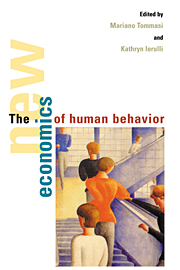Book contents
- Frontmatter
- Contents
- Contributors
- Preface
- Introduction
- PART I DISCRIMINATION AND IMMIGRATION
- PART II CRIME, PUNISHMENT, AND RIGHTS
- PART III ALL IN THE FAMILY
- PART IV GOVERNMENT AND POLITICS
- PART V HEALTH, RELIGION, AND MASS BEHAVIOR
- 10 The economic approach to addictive behavior
- 11 Household production, human capital, and the economics of religion
- 12 The blind leading the blind: social influence, fads, and informational cascades
- 13 Public health and economic epidemiology
- Index
12 - The blind leading the blind: social influence, fads, and informational cascades
Published online by Cambridge University Press: 03 December 2009
- Frontmatter
- Contents
- Contributors
- Preface
- Introduction
- PART I DISCRIMINATION AND IMMIGRATION
- PART II CRIME, PUNISHMENT, AND RIGHTS
- PART III ALL IN THE FAMILY
- PART IV GOVERNMENT AND POLITICS
- PART V HEALTH, RELIGION, AND MASS BEHAVIOR
- 10 The economic approach to addictive behavior
- 11 Household production, human capital, and the economics of religion
- 12 The blind leading the blind: social influence, fads, and informational cascades
- 13 Public health and economic epidemiology
- Index
Summary
Introduction
Why do teenagers at one school take drugs while at another they “just say no”? Why do Americans act American, Germans act German, and Indians act Indian? Why did English and American youths enthusiastically enlist to fight in World War I, whereas pacifist sentiments were more popular before World War II and in the 1960s? These are all examples of one of the most striking regularities of human society: localized conformity.
Localization in either time or place seems to cast doubt upon the idea that people make rational and intelligent choices. If illegal drug use is a bad idea, why do people participate in waves of abuse of different kinds of drugs at different times? If the sale of marijuana is illegal in America, why is it sold legally in Amsterdam drug cafes? If the Chinese know that cold drinks harm the digestion, are Americans blundering when they guzzle Coke?
Part of the explanation is that people in different places don't observe each other's behavior. Germans do many things differently from me, but I don't know specifically what most of these things are. A high school student who sees his friends taking drugs may not realize that members of other cliques do not take drugs.
- Type
- Chapter
- Information
- The New Economics of Human Behaviour , pp. 188 - 215Publisher: Cambridge University PressPrint publication year: 1995
- 33
- Cited by



